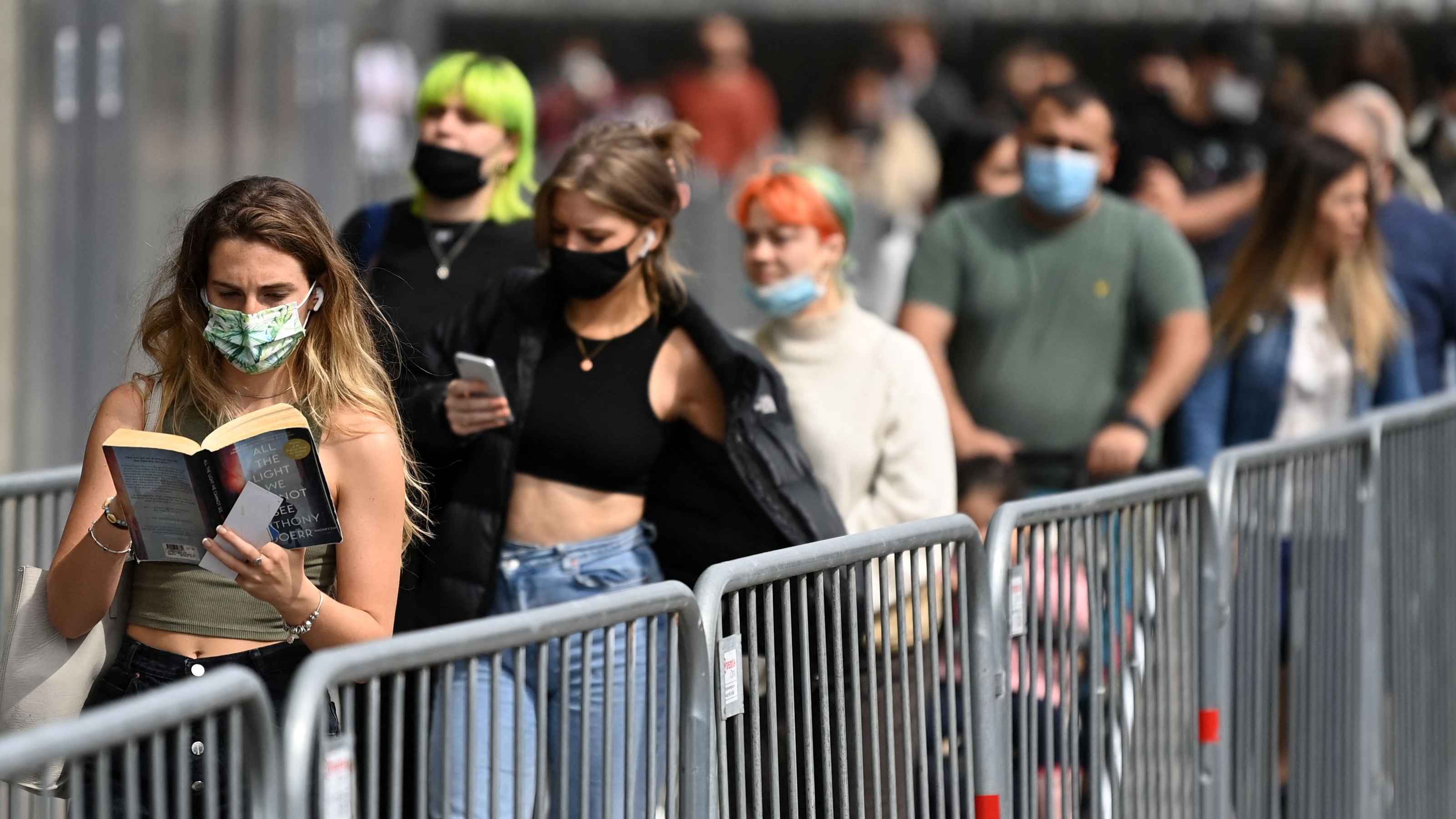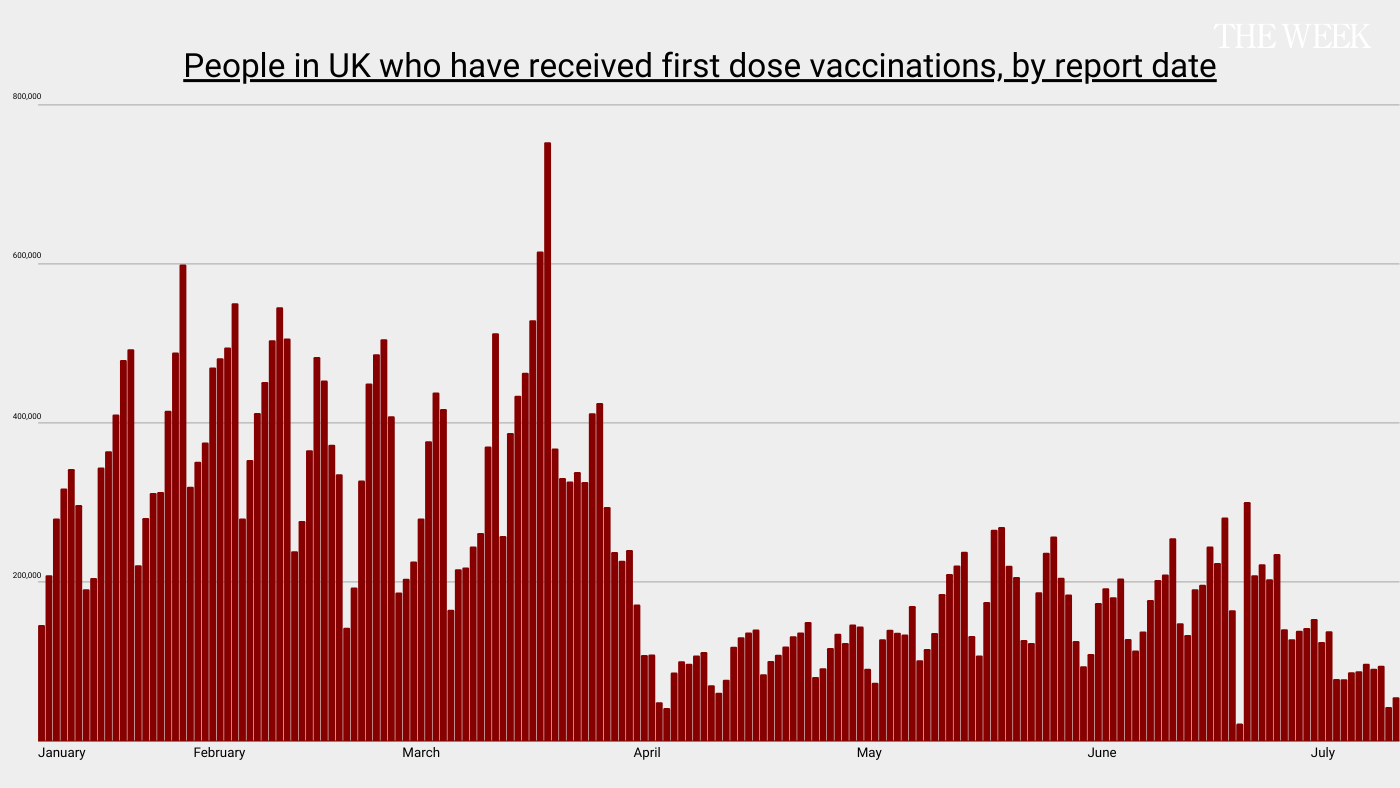Why is the vaccine rollout slowing down?
Younger people are proving more reluctant to receive the jab after initial surge in demand

A free daily email with the biggest news stories of the day – and the best features from TheWeek.com
You are now subscribed
Your newsletter sign-up was successful
Take-up of Covid-19 vaccines has dropped dramatically in recent days, leading to fears that millions of young people are choosing to go unvaccinated.
Last week, government scientists said the country is “close to maximum take-up” of vaccinations, even though a significant proportion of young people are yet to be protected against the potentially life-threatening illness, reports The Times.
Young adults were the last group to be invited to receive the jab, and after an initial surge in demand, “which NHS bosses compared to the scramble for Glastonbury tickets”, says the Daily Mail, bookings have slowed significantly.
The Week
Escape your echo chamber. Get the facts behind the news, plus analysis from multiple perspectives.

Sign up for The Week's Free Newsletters
From our morning news briefing to a weekly Good News Newsletter, get the best of The Week delivered directly to your inbox.
From our morning news briefing to a weekly Good News Newsletter, get the best of The Week delivered directly to your inbox.
Since vaccinations opened up to all over-18s almost a month ago, just 61% of 18-24-year-olds in England have had their first jab. The figure is only a little higher in the 25 to 29 age group, 67% of whom have had at least one jab, says The Sunday Times. The take-up for those above 40 is well over 90%, according to data from the Office for National Statistics.
‘Inevitable slowdown’
“Among the over-30s, it feels as though everyone who put their hand up first time has been done,” John Roberts, from the Covid-19 Actuaries Response Group, told The Telegraph. He said it was “inevitable” that as the programme reached the end it would slow down.
“If fewer people are putting their hands up in areas where hesitancy is high, we are getting to the point where there are not that many people left to do,” he said. “Then the process of trying to get round to those people on a very manual basis, using whatever techniques they use, is inevitably going to be slow.”
A free daily email with the biggest news stories of the day – and the best features from TheWeek.com
So far, around 46 million people have had a first vaccine dose – about 87% of the adult population – and more than 35 million have had a second. As a nation, the UK “continues to be among those with the highest vaccination rates globally”, reports the BBC.

That may explain why some ministers remain fairly “relaxed” about the slowdown, says The Times. Others argue that the removal of quarantine for the fully vaccinated when going on holiday, or after contact with an infected person, may “act as an incentive to boost take-up”.
But as younger and harder-to-reach groups lag behind, the slowdown will “add to concerns about the scale of a summer wave” when restrictions are lifted on Monday, says the paper.
Vaccine hesitancy in young people
People under 30 are most likely to be vaccine “hesitant”, with 9% of 18-21-year-olds and 10% of 22-25-year-olds expressing a reluctance to take the vaccine, according to the latest ONS figures. Across all age groups, only 4% of adults have indicated hesitancy towards the jab.
The reasons for vaccine hesitancy among young people are varied, and can “originate in people’s backgrounds, philosophical or religious beliefs, or approach to risk”, writes the i newspaper.
But there have been some commonly cited concerns, such as the speed the vaccine was developed and safety concerns over possible side effects, says the paper.
Linda Bauld, professor of public health at the University of Edinburgh, also added that poor experiences with authority could also be putting young people off: “A particular reason there for young people being hesitant is because they distrust authority. Maybe they’ve had an experience with police, they don’t trust the local council or the government, [making them feel] disenfranchised.”
And with young people at lower risk of becoming seriously ill from coronavirus, many feel they simply don’t need the jab, according to Dr Mohammed Razai of the Population Health Research Institute at St George’s University of London.
“The risk of severe disease and deaths from Covid is lower, and perception of risk is lower amongst the younger age group,” he told the i. “That is very obviously causing a complacency. It’s true they’re not high risk relative to others, but they are still at risk of complications like long Covid.”
Some young women also fear the jab could affect their fertility, says the Daily Mail, after the Medicines and Healthcare products Regulatory Agency reported that it had received nearly 4,000 accounts from women in the UK who’d said they’d experienced changes to their periods after the jab.
But the Department of Health says there's “no evidence of an increased risk of menstrual disorders owing to the Covid-19 vaccination”, as the number of reports is extremely low compared to the number of women of child-bearing age in the UK who’ve been vaccinated. The BMJ also said there was “absolutely no evidence” that the jab affected fertility.
Sorcha Bradley is a writer at The Week and a regular on “The Week Unwrapped” podcast. She worked at The Week magazine for a year and a half before taking up her current role with the digital team, where she mostly covers UK current affairs and politics. Before joining The Week, Sorcha worked at slow-news start-up Tortoise Media. She has also written for Sky News, The Sunday Times, the London Evening Standard and Grazia magazine, among other publications. She has a master’s in newspaper journalism from City, University of London, where she specialised in political journalism.
-
 Why is the Trump administration talking about ‘Western civilization’?
Why is the Trump administration talking about ‘Western civilization’?Talking Points Rubio says Europe, US bonded by religion and ancestry
-
 Quentin Deranque: a student’s death energizes the French far right
Quentin Deranque: a student’s death energizes the French far rightIN THE SPOTLIGHT Reactions to the violent killing of an ultraconservative activist offer a glimpse at the culture wars roiling France ahead of next year’s elections.
-
 Secured vs. unsecured loans: how do they differ and which is better?
Secured vs. unsecured loans: how do they differ and which is better?the explainer They are distinguished by the level of risk and the inclusion of collateral
-
 A Nipah virus outbreak in India has brought back Covid-era surveillance
A Nipah virus outbreak in India has brought back Covid-era surveillanceUnder the radar The disease can spread through animals and humans
-
 Is the US about to lose its measles elimination status?
Is the US about to lose its measles elimination status?Today's Big Question Cases are skyrocketing
-
 Trump HHS slashes advised child vaccinations
Trump HHS slashes advised child vaccinationsSpeed Read In a widely condemned move, the CDC will now recommend that children get vaccinated against 11 communicable diseases, not 17
-
 A fentanyl vaccine may be on the horizon
A fentanyl vaccine may be on the horizonUnder the radar Taking a serious jab at the opioid epidemic
-
 Health: Will Kennedy dismantle U.S. immunization policy?
Health: Will Kennedy dismantle U.S. immunization policy?Feature ‘America’s vaccine playbook is being rewritten by people who don’t believe in them’
-
 How dangerous is the ‘K’ strain super-flu?
How dangerous is the ‘K’ strain super-flu?The Explainer Surge in cases of new variant H3N2 flu in UK and around the world
-
 Vaccine critic quietly named CDC’s No. 2 official
Vaccine critic quietly named CDC’s No. 2 officialSpeed Read Dr. Ralph Abraham joins another prominent vaccine critic, HHS Secretary Robert F. Kennedy Jr.
-
 This flu season could be worse than usual
This flu season could be worse than usualIn the spotlight A new subvariant is infecting several countries